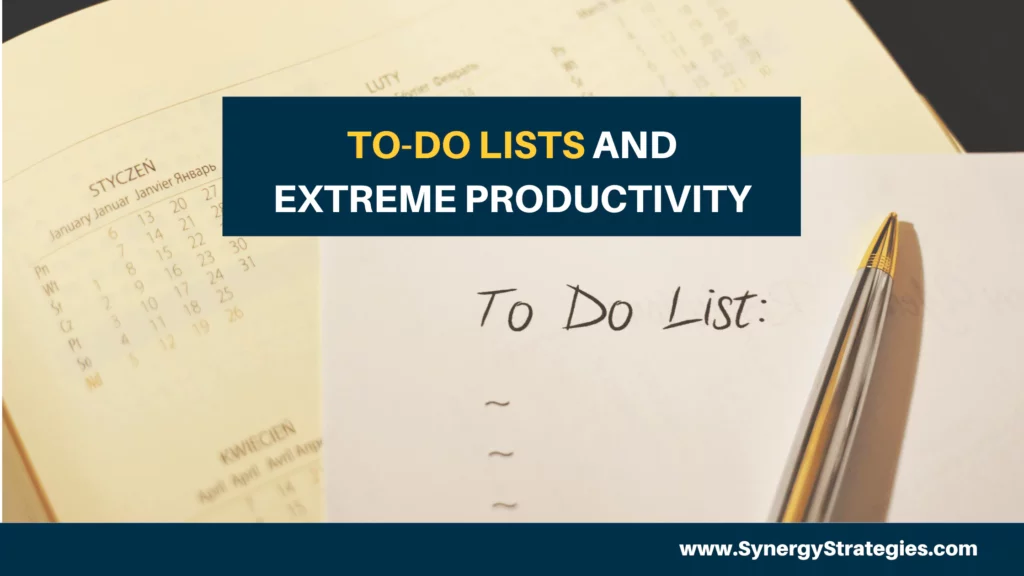Do you want to be more productive? Do you feel frustrated with how much you get done in a day?
I get that to-do lists are not as natural and exciting for some as they are for others who just love crossing things off the to-do list. However, no matter your personality and work style, to-do lists are essential for productivity.
You can test it. Try a day without a to-do list and a day with one. Take a trip without a plan and a trip with one. Arguably you are able to accomplish more with a list and a plan.
For those days that you want to be random, organic, and evolving, forget the to-do list! For those days you need to get things done, MAKE A LIST! Period.
Few Tricks:
#1) Separate work, home, personal, and big projects. My favorite is a piece of paper with a big cross in the center, which makes four boxes or sections. Brain dump everything for the day or week and then fold the paper, so you are only looking at the to-do list for the quadrant in which you are currently focused. Look at the work list when at work and have the rest folded back so you are not distracted by it. Conveniently, it is still nearby if you think of something you need to add.
#2) Make your to-do list at night for the next day. Overnight, your mind will subconsciously start working on it. It will begin to put things in order and begin to solve the problems. When you arrive at the day and task, you are able to do it faster because your mind has already been marinating on it!
#3) Put executable tasks, not projects, on your to-do list. Projects involve numerous steps and therefore can get overwhelming. Put the actions/steps that are needed to execute a project.
#4) Generally items that take less than 2 minutes to do, are just done and do not go on to-do lists. However, the more overwhelmed you are or the more 2-minute tasks you have, sometimes they need to go on the list. The key is not holding those items in your mind because it slows your mind down by remembering rather than focusing on the task at hand.
#5) Start with a fresh list each day (made the night before). While you might have a list of things you want to do for the week, have a to-do list for that day. It is like a commitment and plan for what you can reasonably achieve in a day. Also, you can challenge yourself to clear it which feels rewarding and gives a sense of accomplishment when finished. Usually, a reasonable list can have about 7-10 items for a workday. There might be a mix of larger and smaller tasks but a reasonable amount to finish in a day. Tasks that are not done get rolled to the next day. This also is a motivational thing because after re-writing the same take for 5 days you really want to get it done.
#6) Notice tasks that you procrastinate or frequently must rollover. Make sure to have tasks you enjoy and want to do as well as those “toilet cleaning” tasks you don’t want to do but need to. Have a good balance. Days that are filled with tasks we don’t want to do are a result of days full of things we want to do and then the “need to do” tasks get delayed, procrastinated, and rolled over creating painful days full of uninspiring tasks. Make sure each day you push through both tasks you WANT to do and those you really don’t want to do but NEED to do. This will help your motivation and momentum. Plus, when you finish a “need to do” task, you will feel great and relieved, giving you a burst of energy for other tasks. Brian Tracy’s Eat that Frog helps for those “need to do tasks” https://vimeo.com/99071769
#7) Important versus urgent items are often disguised in the urgency we “want” to do it or have “no choice”. The problem is urgent items will run your day and your life. The lie is that people think they have no choice. The truth is, when you allow urgent things to run your day, the urgent things multiply because you do not spend time on the important. The important will eventually become urgent. Unfortunately, once an important item becomes urgent you lose the ability to be strategic about it and you are actually wasting time reacting rather than responding. Consider the menu plan for the week and the strategic grocery store trip on Sunday versus going every day because you didn’t know what you were going to have. Not only does that 3-7x the time (making more grocery trips) but an unplanned grocery trip will 3-10x your grocery budget as well with impulsive shopping and purchasing more expensive things that are more prepared because you don’t have time. The same concept applies to work, tasks, anything. Important items are things that require space and margin to be intentional to do them and not just react. When you do this you have fewer urgent items and actually multiply the reduction of urgent things (the same concept as above in reverse). People like to think they can just hurry through the urgency and “get on top of it”. People NEVER get on top of it that way. The best way is to protect time for the IMPORTANT. Really the time management rule of thumb is this: In an 8-hour work day, leave 2 hours for the unexpected (a type of urgent). On your to-do list you will likely have some urgent things to do, let’s give you 2 hours for those. Challenge yourself to spend 50% of your day on important (proactive, planned, strategic, and non-reactive measures). Even this will help to flip your time and give you MORE time for what you want versus feeling like you have no time but are always busy.
MORE time for what you want
There is more, but pick one of those principles and practice in your work and life. Let us know what works, what doesn’t and what would make these strategies better!






